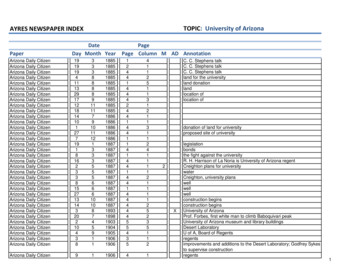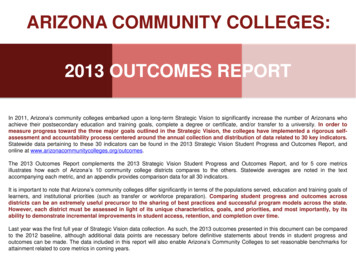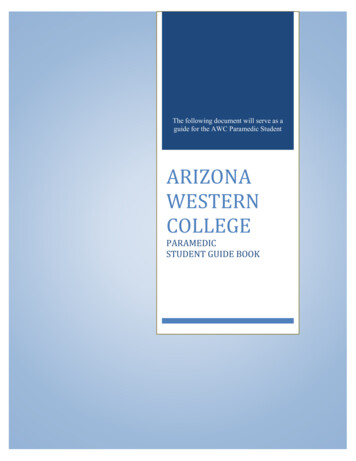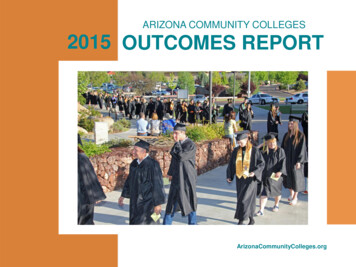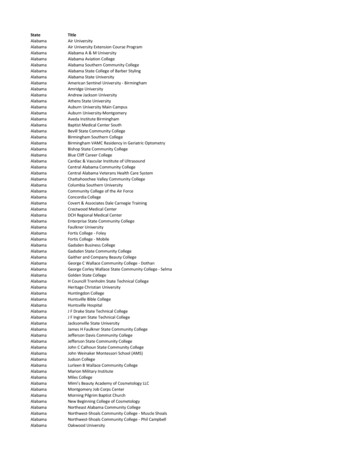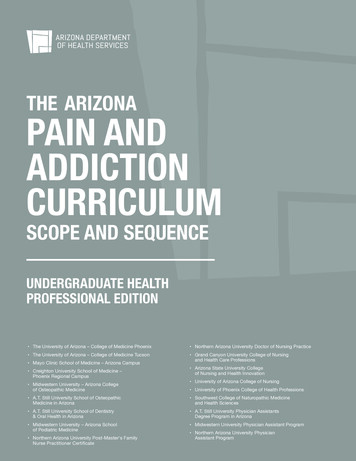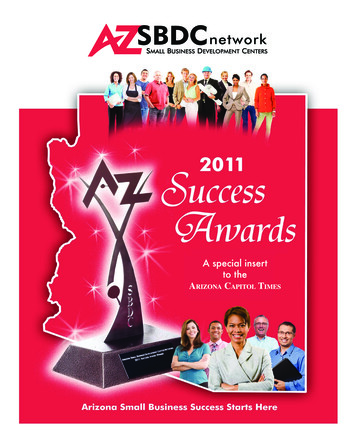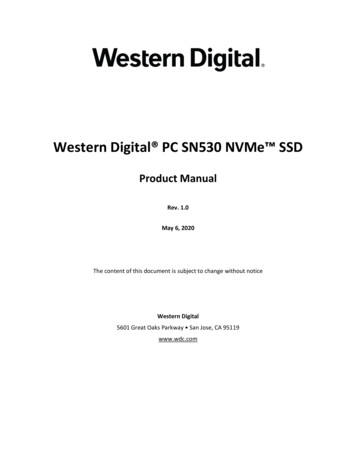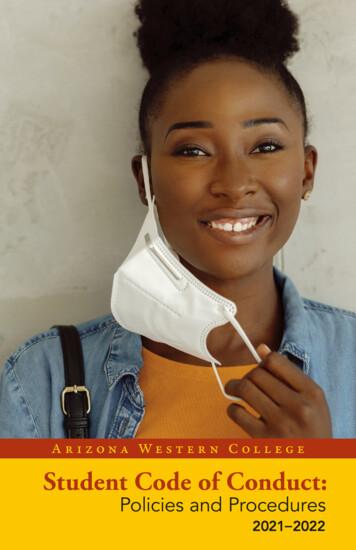
Transcription
Ar izona Western CollegeStudent Code of Conduct:Policies and Procedures2021– 2022
Equal Opportunity StatementArizona Western College does not discriminate in admission or access to, ortreatment or employment in, its services, programs, or activities on the basisof race, color, religion, sex (including pregnancy, gender identity, and sexualorientation), national origin, age (40 or older), disability or genetic informationor handicapping condition in compliance with the laws of the United Statesand the state of Arizona. Any questions regarding the applicability of state andfederal anti-discrimination laws to Arizona Western College and its services,programs or activities, and any grievances or claims of violation of such laws,should be directed to its compliance officer:Ms. Karen JohnsonChief Human Resources OfficerP.O. Box 929Yuma, AZ 85366-0929(928) 344-7505karen.johnson@azwestern.eduStudents with Disabilities Resources and Service InformationArizona Western College seeks to provide reasonable accommodations forstudents with documented disabilities in order to facilitate access to Collegeclasses and activities. Students seeking such an accommodation should makean official request at AccessABILITY Resource Services located in the CollegeCommunity Center (3C) on campus or at azwestern.edu/accessability.Any questions regarding the applicability of state and federal anti-discriminationlaws to Arizona Western College and its services, programs or activities, andany grievances or claims of violation of such laws, should be directed to itscompliance officer:Ms. Karen JohnsonChief Human Resources OfficerP.O. Box 929Yuma, AZ 85366-0929(928) 344-7505karen.johnson@azwestern.edu
Table of Contents1. Introduction. . . . . . . . . . . . . . . . . . . . . . . . . . . . . . . . . 2The College Community. . . . . . . . . . . . . . . . . . . . . . . . . . . . . . . . . . . . . . . . . . . . . . .Purpose of this Student Code of Conduct. . . . . . . . . . . . . . . . . . . . . . . . . . . . . . . . .Modification of Code. . . . . . . . . . . . . . . . . . . . . . . . . . . . . . . . . . . . . . . . . . . . . . . . . .Questions Regarding Code. . . . . . . . . . . . . . . . . . . . . . . . . . . . . . . . . . . . . . . . . . . . .Definitions. . . . . . . . . . . . . . . . . . . . . . . . . . . . . . . . . . . . . . . . . . . . . . . . . . . . . . . . . . .223332. Authority. . . . . . . . . . . . . . . . . . . . . . . . . . . . . . . . . . . . 5Student Disciplinary Authority . . . . . . . . . . . . . . . . . . . . . . . . . . . . . . . . . . . . . . . . . . 5Faculty Authority for Situations Involving AcademicMisconduct and/or Classroom Misbehavior. . . . . . . . . . . . . . . . . . . . . . . . . . . . . . . 53. Jurisdiction . . . . . . . . . . . . . . . . . . . . . . . . . . . . . . . . . . 5Conduct Covered by this Code. . . . . . . . . . . . . . . . . . . . . . . . . . . . . . . . . . . . . . . . .Individuals Covered by this Code. . . . . . . . . . . . . . . . . . . . . . . . . . . . . . . . . . . . . . . .Right To Restrict Non-Members of the College Community . . . . . . . . . . . . . . . . .Students Covered Under Additional Rules and Regulations. . . . . . . . . . . . . . . . . .Prosecution for Violations . . . . . . . . . . . . . . . . . . . . . . . . . . . . . . . . . . . . . . . . . . . . . .556674. Supportive Provisions of This Code . . . . . . . . . . . . . 7Victims of Alleged Misconduct. . . . . . . . . . . . . . . . . . . . . . . . . . . . . . . . . . . . . . . . . .Victims of Sexual Misconduct. . . . . . . . . . . . . . . . . . . . . . . . . . . . . . . . . . . . . . . . . . .Defense of Self, Others and Property . . . . . . . . . . . . . . . . . . . . . . . . . . . . . . . . . . . .Civil Liability for Damage to College Property. . . . . . . . . . . . . . . . . . . . . . . . . . . . .77885. Prohibited Conduct. . . . . . . . . . . . . . . . . . . . . . . . . . . 8Articles of Prohibited Conduct. . . . . . . . . . . . . . . . . . . . . . . . . . . . . . . . . . . . . . . . . . 86. Reporting, Investigation(s) and Finding(s). . . . . . . . 15Reporting (Compliant) Procedure. . . . . . . . . . . . . . . . . . . . . . . . . . . . . . . . . . . . . . .Investigation Process and Assigning the Matter to theInformal or Formal Process . . . . . . . . . . . . . . . . . . . . . . . . . . . . . . . . . . . . . . . . . . . .Informal Conduct Meeting(s). . . . . . . . . . . . . . . . . . . . . . . . . . . . . . . . . . . . . . . . . . .Informal Outcome Reviews for Appeals. . . . . . . . . . . . . . . . . . . . . . . . . . . . . . . . . .Formal Investigation(s) and Hearing(s). . . . . . . . . . . . . . . . . . . . . . . . . . . . . . . . . . .Requirement of Substantial Compliance. . . . . . . . . . . . . . . . . . . . . . . . . . . . . . . . .Discipline and Hearing Records . . . . . . . . . . . . . . . . . . . . . . . . . . . . . . . . . . . . . . . .151517181821227. Sanctions . . . . . . . . . . . . . . . . . . . . . . . . . . . . . . . . . . . 22Temporary Injunction. . . . . . . . . . . . . . . . . . . . . . . . . . . . . . . . . . . . . . . . . . . . . . . . . 258. College Disciplinary Appeals Process . . . . . . . . . . 27Appeals:. . . . . . . . . . . . . . . . . . . . . . . . . . . . . . . . . . . . . . . . . . . . . . . . . . . . . . . . . . . . 27Appeals Process:. . . . . . . . . . . . . . . . . . . . . . . . . . . . . . . . . . . . . . . . . . . . . . . . . . . . . 279. Readmission. . . . . . . . . . . . . . . . . . . . . . . . . . . . . . . . . 28
Student Code of ConductPolicies & Procedures1.IntroductionThe College CommunityArizona Western College (the “College” or “AWC”) is a community in whichintellectual growth, learning from others, mutual tolerance, and respect forfreedom of thought and expression are principles of paramount importance.AWC was established, in part, to promote the exchange of knowledge in anenvironment that encourages reasoned discourse, intellectual honesty, culturaland intellectual diversity, and respect for the rights of all persons.The College Community is defined as students, District Governing Boardmembers, administrators, faculty, and other College employees or affiliates.Attendance at a public community college is not compulsory; consequently,individuals entering the College Community voluntarily assume all obligationsof performance and behavior reasonably expected by the College. The Collegeis a “special purpose” institution and, as such, can set forth additional expectations than those of the community in general.By accepting membership in this community, individuals neither surrender theirrights nor escape their responsibilities as citizens, but acquires the rights andresponsibilities set forth in this code, as well as responsibilities to, the CollegeCommunity. Each individual member of this community is responsible for his orher own actions and is expected to respect the rights of others.Purpose of this Student Code of ConductThis Student Code of Conduct (the “Code”) is intended to provide the framework for an orderly and stable College environment for the College Community.The Code is promulgated to protect the freedoms to which its members areentitled, and to ensure that the College Community can pursue and accomplishits purposes and carry out its functions and activities without obstruction.This Code obligates students to respect the rights, privileges, and property ofother members of the College Community and visitors to the campus. Studentsand/or attendees must refrain from actions which would interfere with College4
functions or endanger the health, welfare or safety of other persons, practicehigh standards of academic and professional honesty and integrity, and complywith the rules and regulations of the College and its departments.AWC does not tolerate violence against any student, faculty, staff, orguest of the College.In general, this Code sets forth duties owed by students to each other, to theCollege, and to other members of the College community. It also sets forthadministrative procedures whereby students accused of violating Collegerules are afforded due process and, if the preponderance of evidence warrants, receive fair discipline. Finally, this Code specifies procedures by which astudent may appeal certain decisions. Students are responsible for knowingand understanding the contents of this Code.Modification of CodeThe College reserves the right to modify this Code, in its discretion. The provisions of this Code shall not be construed to replace or supersede any state,federal or local laws that also may apply to students or others.Questions Regarding CodeAny question of interpretation regarding this Code shall be referred to the Deanof Students. This Code will be reviewed and updated at the discretion of theDean of Students. This Code will be reviewed at a minimum of every three years.DefinitionsRespondent — A student, group of students or Student Organization who hasallegedly violated the Arizona Western College Code of Conduct.College Community Member — Any person associated with Arizona WesternCollege through enrollment in classes, employment, status as a GoverningBoard member, or participation in College activities and/or programs.College Representative — A person who presents evidence of student misconduct and represents the interests of the College administration at a FormalConduct Hearing.Claimant — A student, faculty member, or AWC affiliated party who makes anallegation against a student for a violation of the Student Code of Conduct orother published policy or procedure.Complainant — Term utilized in Title IX Proceedings: Defined as the personwho is alleged to be the victim of conduct that could constitute sexualharassment, discrimination or retaliation for engaging in a protected activity.5
Complaint — Initial incident report or document filed with the StudentConduct Office or other authorized person that contains allegations ofstudent misconduct.Conduct Officer — A professional staff member, faculty member or otherperson designated by the Dean of Students to serve as a Conduct Officer inorder to determines if a violation of the Student Code of Conduct has occurred.Consensual — An agreement or mutual consent between two or more partiesthat encompasses any action or pattern of behaviors.Consent — An affirmative, unambiguous, acceptance or voluntary agreement without protest. This agreement can be provided by words or actionsthat create clear, mutually understood permission to engage in an activity oractivities. Consent may be withdrawn at any time and must be active and notpassive, given freely, specific, and provided knowingly. Any person(s) who lackslegal capacity to consent (for example, a minor), is unconscious, unaware, seriously impaired by drugs or alcohol or otherwise helpless, is incapable of givingconsent. Additional information relative to Sexual Assault and/or Sexual Activityand its policy is located at azwestern.edu/titleix.Evidence — Documents, including witness statements, testimony, photographs, video or audio recordings, texts, social media posts or comments,or physical items that provide relevant information in relation to a ConductInvestigation or during an Informal or Formal Conduct Hearing.Formal Conduct Hearing Officer — The Dean of Students who is designatedto function as the hearing officer at a Formal Conduct Hearing.Parties — The person(s) whom the compliant is made about and the CollegeRepresentative.Preponderance of Evidence — A standard of proof in which evidence ispresented that is sufficient to make a reasonable person believe that a factsought to be proved is more likely true than not.Prohibited conduct — Any behavior that is inconsistent with the standards ofthe College Community encompassed in the Student Code of Conduct and/orother standards of behavior published by the College.Sanction/Action Items — A course of action or outcome imposed forviolations of the Student Code of Conduct.Student — All individuals who are matriculated and/or enrolled to attend classfull or part-time at Arizona Western College, at Northern Arizona University(NAU) in Yuma, or in University of Arizona (UofA), and/or Arizona StateUniversity (ASU) programs in Yuma.6
2.AuthorityStudent Disciplinary AuthorityPursuant to authority granted by A.R.S. §13-2911 and A.R.S. §15-1444, theArizona Western College District Governing Board has established policiesregulating student conduct and student discipline that occurs both on and offCollege property, as specified in more detail in Section 3 below. In accordancewith these District Governing Board policies (including without limitationDGB Policy #550) and pursuant to applicable administrative procedures(including, but without limitations, AWC Procedure #550.1), the Dean ofStudents has primary authority and responsibility for the administration ofstudent discipline. Further delegation of this authority may be made by theDean of Students, the Vice President for Student Services, or the Vice Presidentfor Learning Services.Faculty Authority for Situations Involving Academic Misconduct and/orClassroom MisbehaviorAny student who engages in dishonest academic work or who engages in prohibited conduct in the classroom may be subject to action by the instructor. Inthe event of disruptive student behavior in the classroom, faculty membershave the authority to temporarily exclude a student from the current classsession. Persistent disorderly behavior, cases of academic dishonesty and otherviolations of the Code should be referred to the Conduct Office by submitting an Incident Report. A Conduct Officer has the authority to implement allaspects of the procedures as set forth in this Code.3.JurisdictionConduct Covered by this CodeThis Code will apply to and govern all conduct, henceforth referred to as“Covered Conduct,” that: (1) occurs on College property; (2) occurs at a Collegesponsored, sanctioned or supervised class, activity, contest, conference,meeting or other function (Cumulatively “College Activity or Event”) regardless of location and is inclusive of travel, lodging and unscheduled time relatedto such College Activity or Event. ; or (3) occurs at any location and at any timewhen such conduct disrupts or otherwise adversely impacts the operations ofthe College. A student who engages in Covered Conduct that is prohibited bythis Code shall be subject to disciplinary processes set forth in this Code.Individuals Covered by this CodeThis Code, as well as other College rules and regulations governing studentconduct, shall apply to the Covered Conduct of all individuals who are matric7
ulated and/or enrolled to attend class full or part-time at Arizona WesternCollege, at Northern Arizona University (NAU) in Yuma, or in University ofArizona (UofA), and/or Arizona State University (ASU) programs in Yuma. Astudent’s withdrawal does not limit the College’s right to commence and/orcontinue the processing of a conduct hearing or to impose sanctions followinga determination that a Code violation occurred.Right To Restrict Non-Members of the College CommunityThe College reserves the right to restrict or prohibit the presence of a personwho is not a member of the College Community from being on Collegeproperty or attending College events whenever that individual’s presence isconsidered detrimental to the welfare of the College.Students Covered Under Additional Rules and RegulationsIn addition to the requirements imposed by this Code on all students, somestudents may be subject to additional rules and regulations imposed byCollege departments or outside agencies. Examples of such situations include:3.1 esidence Hall Students: Students residing on campus will additionallyRbe subject to Residence Life rules and regulations, as may reasonablybe adopted or modified from time to time. The Director of Housing& Residence Life, Residence Hall Directors and Resident Assistantsare authorized to issue warnings for violations of Residence Life rulesand regulations. The Director of Housing & Residence Life may revokecertain Residence Life related privileges of individuals violating Residence Life rules. A student who violates Residence Life rules may alsobe summoned to appear at a Formal Conduct Hearing and may subsequently lose the privilege of on-campus residence or be otherwisedisciplined.3.2 tudent Extracurricular Activities—including Athletics: Students parSticipating in extracurricular activities will additionally be subject to rulesand regulations set forth in club, team, or organization handbooksor otherwise established by the applicable departments. Studentsdetermined to be in violation of such rules may be sanctioned bythe appropriate staff or administrator, which may include probation,suspension or withdrawal from the privilege of extracurricularactivity participation. Such students may also be disciplined by aConduct Officer.3.3 AU in Yuma, UofA and ASU in Yuma and Consortium Students:NIn addition to the behavioral requirements and disciplinary proceduresimposed by this Code on AWC students, students in partnershipprograms with AWC taking coursework shall be subject to all applicable8
policies, rules and regulations promulgated by AWC and their homeinstitution. A student may, therefore, face disciplinary action by AWC,NAU, UofA or ASU administrative personnel, depending upon thespecific parameters of the case.3.4 tudents Participating in College Sponsored Activities: Students whoSparticipate or are otherwise involved in a College sponsored event on oroff College property will be subject to this Code and to such additionalrules and regulations as may reasonably be imposed by College representatives related to such event. Lodging during travel is considered anextension of College housing; and therefore, students are subject to allof the rules and regulations that apply to the residence halls.3.5 tudents with Outstanding Housing Debts: Nonpayment of financialSobligations constitutes authorization for administrative removal ofthe student from housing. Students who wish to dispute outstandingdebts will be provided an adjudication process by the Vice President forFinance and Administrative Services or designee.Prosecution for ViolationsAn individual may be charged and prosecuted for the same alleged conductby both the College and the criminal justice system. Disciplinary action bythe College is not subject to challenge or postponement on the groundsthat criminal charges or civil litigation involving the same incident has beendismissed, reduced, or is pending in court.4.Supportive Provisions of This CodeVictims of Alleged MisconductA victim of alleged misconduct, upon request, will be informed of the stepsthat can be taken if the accused student or another party intimidates orharasses the victim. Nothing in this Code shall be construed to preclude avictim from seeking criminal or civil judicial remedies against an alleged wrongdoer. To the extent permitted by applicable law, victims of alleged misconductmay be informed concerning the status and outcome of discipline proceedings.Victims of Sexual MisconductCollege personnel provide victims of sexual misconduct with informationregarding their legal rights, counseling, classroom and campus residencerelocation options and the names and telephone numbers of local agenciesthat are available to provide assistance. The College administration will seekto protect the identities and confidentiality of statements made by sexual9
misconduct victims to the extent permitted by law, unless and to the extentthat such confidentiality unreasonably interferes with the College’s ability toinvestigate and/or prosecute reported allegations of sexual misconduct.Sexual Discrimination and Misconduct that rises to the level of a Title IXclaim will be investigated through the Title IX Grievance process. For moreinformation, refer to the Arizona Western College Title IX policy located atazwestern.edu/titleix.Defense of Self, Others and PropertyA student shall not be disciplined for threatening or using physical force againstanother when, and to the extent a reasonable person would believe, such forceis necessary to protect that person or a third person against another person’suse or attempted use of unlawful or otherwise inappropriate physical force.Verbal provocation alone does not justify the use of physical force.A student shall not be disciplined for threatening or using physical force againstanother when, and to the extent, a reasonable person would believe such forceis necessary to prevent theft or criminal damage to property.Civil Liability for Damage to College PropertyA student shall be legally responsible for damage to College property causedby that student. The student may be required to pay for replacement or repairof damaged property through an appropriate civil process. The student alsomay face the imposition of discipline.5.Prohibited ConductArticles of Prohibited ConductThe following Covered Conduct is prohibited by this Code:5.15.210 Disruptive Conduct: An individual shall not engage in disorderly, lewdor indecent conduct or any conduct that is reasonably likely to causea breach of peace, or that threats to disrupt or actually disrupts anyCollege function, process or activity including teaching, research, andadministration of public service functions on or off campus. Alcohol, Drugs and Drug Paraphernalia: Arizona Western College is a“dry” campus meaning that an individual– regardless of age– are prohibited from hosting, possessing, consuming, and/or being in the presenceof others consuming drugs and/or alcoholic beverages on all AWCgrounds and/or at any College Event or Activity. Additionally, an individual shall not possess, sell, offer to sell, purchase, offer to purchase,use or transfer illegal drugs, drug paraphernalia or alcohol, or be under
the influence of alcohol, drugs or medication (except as prescribed bya physician and used in accordance with the prescription), or furnishalcohol to a minor. The term “drugs” includes any narcotic, dangerousdrug, steroid, vapor releasing toxic substance, marijuana, or controlledsubstance (imitation or otherwise) as defined by law. The term “medication” means any substance that is available legally by prescription only,but does not apply to marijuana, which for the purpose of this policy isconsidered a drug. The passage of Arizona Proposition 203, commonlyknown as the Medical Marijuana Law, notwithstanding, Arizona WesternCollege prohibits the possession, use or transfer of marijuana on anyCollege property and/or at any College Event or Activity.5.3 Tobacco Use: An individual shall not use tobacco on all school property.Smoking and the use of smokeless tobacco products are prohibited oncampus property to include; all buildings, owned property, leased property, facilities, grounds, parking structures (including privately ownedvehicles), campus-owned vehicles and rented vehicles (including chartered buses or vans). The term “tobacco” includes all tobacco derivedor containing products, including and not limited to, cigarettes (clove,bidis, kreteks), electronic cigarettes, cigars, cigarillos, blunts, hookah,pipes and/or oral tobacco, smokeless chew and/or snuff. It alsoincludes any product intended to mimic tobacco products or containtobacco flavoring.5.4 Academic Dishonesty: An individual shall not engage in any form ofacademic dishonesty, including but not limited to cheating, fabrication,facilitating academic dishonesty, copyright violation, or plagiarism. Anindividual shall not use or attempt to use the academic work or researchof another person (or agency engaged in the selling of academic materials) and represent that it is his or her own or otherwise engage indishonest academic work. An individual shall not share his or her knowledge or work with another student during an examination, test, or quizor other academic assignment unless specifically approved in advanceby the instructor. An individual shall neither bring to an examinationany materials nor notes unless approved by the professor nor shall theindividual receive or attempt to receive any test response from anotherstudent during an exam or at any time unless expressly authorized by afaculty member.5.5 Sexual Misconduct: An individual shall not engage in conduct that constitutes sexual misconduct, whether forcible or non-forcible, includingbut not limited to, sexual assault, public sexual indecency, or indecent11
exposure. Sexual misconduct encompasses a range of behaviors including but not limited to inappropriate touching of a person’s breasts/chest,buttocks, inner thighs, groin, or genitalia, either directly or indirectly,indecent exposure, public sexual indecency and sexual assault.125.6 Sexual Harassment: An individual shall not engage in sexual harassmentwhich consists of any unwelcome sexual advance, request for sexualfavors or other written, verbal, or physical conduct of a sexual naturewhen: (1) submission to or rejection of the conduct is made either anexplicit or implicit condition for access or decisions relating to any College-related opportunities; (2) the expression or conduct substantiallyinterferes with an individual’s work or academic performance or createsan unreasonably intimidating, hostile or offensive work, learning or otherCollege-related environment; or (3) the expression of sexual or socialinterest in an individual continues after being informed that the interestis unwelcome.5.7 Sexual Exploitation: An individual shall not engage in conduct thattakes non-consensual or abusive sexual advantage of another for his/herown gain or benefit; or for the gain or benefit of anyone other than theone being exploited. Examples of sexual exploitation may include butare not limited to prostituting another person, non-consensual videoor audio-taping of sexual activity, unauthorized presentation of suchrecordings, allowing others to observe a personal act of consensual sex,without knowledge or consent of the partner, engaging in peepingtommery, voyeurism, and knowingly transmitting a sexually transmitteddisease (STD) or Human Immunodeficiency Virus (HIV) to anotherstudent.5.8 talking and Cyber-Stalking: An individual shall not engage in stalkingSwhich consists of a course of conduct directed toward another personand knows or should reasonably know that such conduct is likely toalarm, harass, or cause reasonable fear of harm or injury inthat person, or in a third party. The feared harm of injury may beto physical, emotional or mental health, personal safety, property,education, or employment. Stalking may include, but is not limited to,unwanted visual or physical proximity to a person, repeatedly conveyingoral or written threats, extorting money or valuables, implicitly threatening physical conduct, using electronic media such as the internet,pagers, cell phones, or other similar devices to pursue, harass or makeunwanted contact with another person in an unsolicited fashion or anycombination of these behaviors directed at/or toward a person.
5.9 arassment and Discrimination: An individual shall not harass anotherHperson. Harassment includes written or verbal abuse of a serious nature(either as a result of the severity or repetitive nature of the conduct)that humiliates or intimidates another individual and does not otherwise advance matters of public concern. Harassment also includes anyconduct that could reasonably be expected to cause fear or apprehension on the part of another individual including persons submittingcomplaints, serving as witnesses or members of adjudicating committees. An individual shall not engage in conduct that is directed towardanother person if that conduct would cause a reasonable person tofear for the person’s safety or the safety of that person’s immediatefamily member or close acquaintance, and that person in fact fears forhis or her safety or the safety of an immediate family member or closeacquaintance. An individual shall not engage in discriminatory conducton the basis of age, ethnicity, gender, disability, color, national origin,race, religion, sexual identity, or veteran status5.10 Relationship Violence (Domestic Violence, Dating Violence and/orRelationship Abuse): An individual shall not engage in conduct that constitutes relationship violence. Relationship and/or Domestic violencemay include coercive and abusive behaviors including, but not limitedto; physical, sexual, psychological, verbal and/or emotional behaviorsdirected towards a current or former intimate partner.5.11 hreats, Assaults and Fighting: An individual shall not verbally or physiTcally threaten, abuse, assault or engage in a fight with any student,College employee or any other person.5.12 Defamation: An individual shall not use defamatory words or phrasesor distribute defamatory materials. Defamatory words or materials arethose that: (1) are false and expose any person or the College to hatred,contempt, ridicule, disgust or an equivalent reaction; or (2) are false andtend to impugn a person’s occupation, business or office.5.13 bscenity and Vulgarity: An individual shall not use or wear, obsceneOor vulgar language or gestures, distribute or exhibit obscene or vulgarmaterials. Obscene materials, language or gestures are those that anaverage person, applying contemporary standards of the Collegecommunity, would find that taken as a whole, appeal to prurientinterests and lack serious literary, artistic, political or scientific value.5.14I nitiation and Hazing: An individual shall not engage in any activityinvolving an initiation, hazing, intimidation, assault, or other activityrelated to group affiliation that is likely to cause or does cause bodily13
danger, physical harm, mental harm, or personal degradation orhumiliation. All initiations, including those related to any College club,athletic team, or other groups are subje
allegedly violated the Arizona Western College Code of Conduct. College Community Member — Any person associated with Arizona Western College through enrollment in classes, employment, status as a Governing Board member, or participation in College activities and/or programs. College Representative — A person who presents evidence of .
